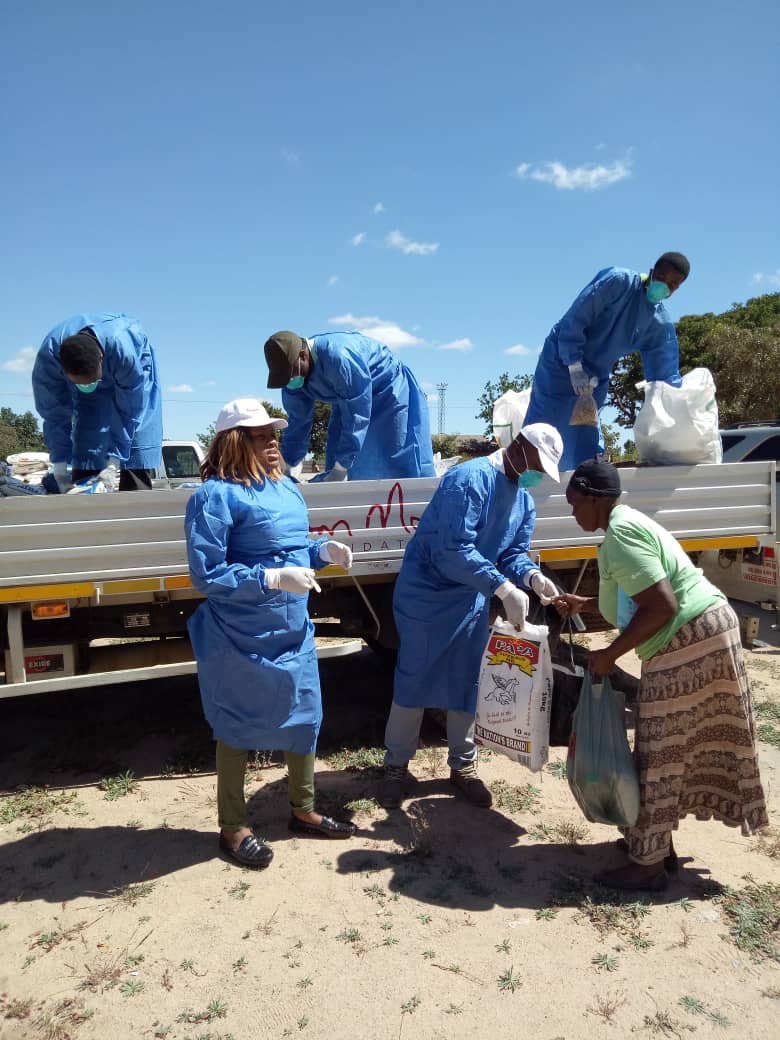The Adam Molai Foundation, a non-profit philanthropic organisation running programmes to ease poverty amongst underprivileged, has come to the rescue of nearly 100 families in Marondera amid the COVID-19 pandemic. With the effects of the pandemic being felt globally, the foundation has pushed to continue supporting the communities who need food assistance the most.
The foundation carried out a feeding programme in Dombotombo and Nyameni suburbs three times a week before the COVID-19 outbreak, and a ban on gatherings brought it to a halt. In its place, they introduced an initiative to give food hampers to the vulnerable, who comprise the elderly, women and children.
The food hampers comprise 2 litres cooking oil, 6 kilograms samp, 6 kilograms rice, 2 kilogrammes soya chunks and 10 kilogrammes mealie meal, enough to last for at least a month.
Speaking during a handover of food hampers to beneficiaries this week, the foundation’s chairman, Itai Watinaye, said that since its inception the Adam Molai Foundation has never shied away from responding to government’s call to assist in any situation that poses a humanitarian threat.
“The foundation acknowledged government’s efforts in the fight against the rapid spread of Covid-19 virus and remained available to support such initiatives as this defined their values as a people, society and above all the communities require that support,” Watinaye said.
Adam Molai Foundation was founded in 2016 with the vision is to become a leading local developmental agency in uplifting vulnerable communities through self-sustenance using and harnessing the environment whilst leveraging on new and existing infrastructure. Among their objectives is establishing sustainable income-generating projects to vulnerable communities.
The feeding programme benefits 49 families (27 in Nyameni and 22 in Dombotombo) made up of 93 women, men and children. Assisted by members of the local Seventh Day Adventist (SDA) churches in the respective areas, the beneficiaries have shown their appreciation for the intervention when they face several socio-economic challenges.
The foundation’s Programmes Director, Nomagugu Matibiri, said that they did the selection of the needy families with the help of SDA church elders and pastors from their respective communities.
“They identified the most vulnerable members of their communities irrespective of religion, gender or race. The local pastors and elders have an in-depth knowledge and appreciation of the communities in Nyameni and Dombotombo where some of the most vulnerable of the town live,” she said.
During the school term, the foundation also feeds about 1800 learners at Dombotombo Primary School four days a week. They give the learners mahewu fortified with all the essential vitamins and minerals. This has helped improve the learners’ concentration and attendance by contributing to a higher pass rate.
To date, the foundation has not only supported developmental projects across the country but has also responded to government’s call to assist in disaster intervention programs. In the aftermath of Cyclone Idai in 2019, and the Mberengwa floods where they donated new blankets, medical sundries and food to affected victims.
Giving back to the community is another of the Adam Molai Foundation’s goals. In Mutoko, a sewing club they set up has created jobs for women and girls by helping them to establish and operate income-generating projects. Not only does this support come in handy during times of economic hardship, it also ensures sustainability of the projects that empower disadvantaged communities in Zimbabwe to become self-reliant.
Nomagugu said that there were plans to roll out the foundation’s programmes in partnership with the Ministry of Public Service, Labour and Social Welfare, to all the provinces in Zimbabwe. These will cover the Harare and Bulawayo Metropolitan Provinces, Mashonaland East and West, Manicaland, Masvingo, Matabeleland North and South, Midlands and Mashonaland Central.
The foundation has pledged to assist the government in the fight against the COVID-19 epidemic. They have started a wide-ranging set of interventions that include support and capacity building for local tertiary institutions to innovate. They also intend to drill boreholes in vulnerable communities and hospitals to ensure the availability of clean and safe water. The intention is to help protect the lives and livelihoods of communities struggling to make ends meet.






